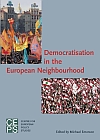Quid Russian Democracy?
Quid Russian Democracy?
Author(s): Nikolay Petrov
Subject(s): Civil Society, Governance, Government/Political systems
Published by: CEPS Centre for European Policy Studies
Keywords: Vladimir Putin; Managed Democracy; Democracy in Russia;
Summary/Abstract: The year 2004 was marked by a whole set of failures by President Vladimir Putin’s regime. Continuation of the anti-federal reform, electoral reform and intensified pressure on civil society should be mentioned in this respect. It was the first year of a purely Putin political regime and one that has proven it to be extremely ineffective.
Nevertheless, during the period from late 2004 to early 2005, the Orange Revolution in Ukraine and the mass protest movement caused by the monetary reform gave room for much more optimism with regard to the prospects of democracy in Russia. Although the glass is still “half full and leaking” to use Michael McFaul’s image, the end of the leaking is clearly in sight because the glass will either be repaired or replaced in a relatively short while.
Since last January, the idea of extreme passivism on the part of the Russian public as a whole and especially among the youth is over, as well as the notion of stagnation under Mr Putin with absolute certainty and predictability.
Russian democracy is in better shape than one could imagine if looking from the outside at what has been going on in the country over the last few years. Indeed, Mr Putin has weakened all the democratic institutions except for the presidency, and last year brought further changes in the direction of authoritarianism. Thus the evaluation by Freedom House reflects the grim state of democracy in Russia. There are, however, at least three reasons to be more optimistic with regard to the future of Russian democracy: 1) the regions, which in some cases are much more democratic than the centre; 2) Russia’s youth, who are much more active and interested in keeping and promoting democracy than has until recently been recognised – indeed, experts are underestimating the impact of the whole shift of the voters’ generation, which has been taking place since the late 1980s; and finally, as explained below, 3) the machinery of managed-democracy (MD).
Book: Democratisation in the European Neighbourhood
- Page Range: 63-70
- Page Count: 8
- Publication Year: 2005
- Language: English
- Content File-PDF

